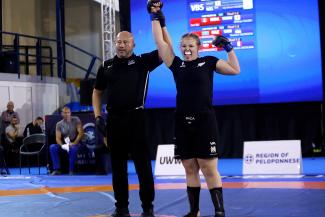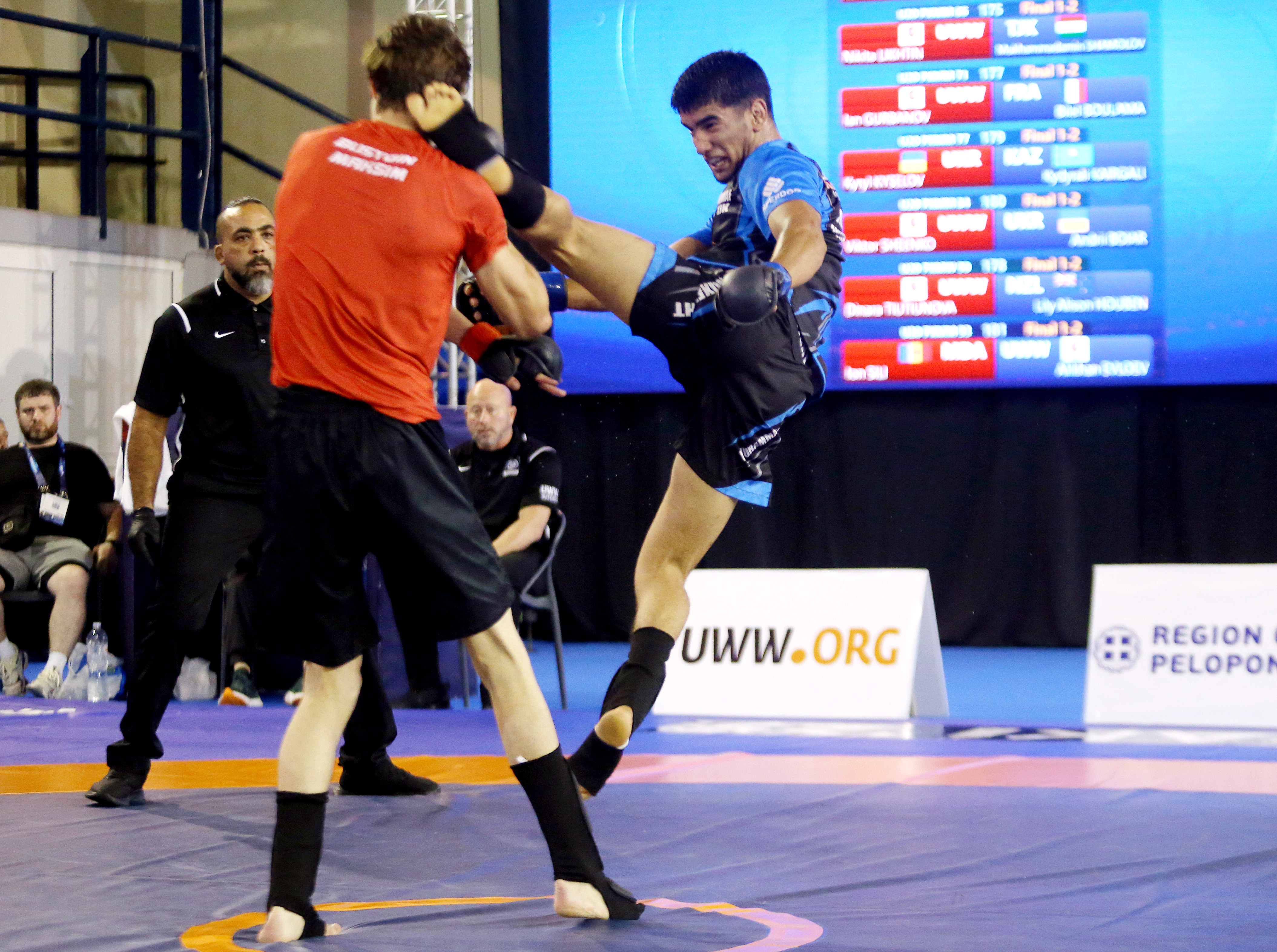Suraj ends India's 32-year drought for U17 GR world gold
Tuesday, July 26, 2022 - 19:28 By Vinay Siwach

ROME, Italy (July 26) -- As he warmed up for his gold medal bout, Suraj VASHISHT (IND) saw an emotional Ronit SHARMA (IND). He ran up to Sharma and consoled him after the latter lost 3-3 in the 48kg Greco-Roman final. It could have been India's first gold at the U17 World Championships in 32 years.
A few moments later, Suraj took it upon himself to create history by winning the 55kg title at the U17 World Championships in Rome. His gold was India's first since Pappu YADAV (IND) won one back in 1990.
Since then, India had five different wrestlers reach the final at a U17 World Championships but none could clear the final hurdle. It took Suraj beating European champion Faraim MUSTAFAYEV (AZE), 11-0, to add another historic moment in India's wrestling.
Overall, this was India's only third gold at the U17 Worlds and fourth at all World Championships combined. Apart from Yadav, who also won the 1992 U20 World Championships, Vinod KUMAR (IND) won the U17 Worlds gold in 1980.
In Rome, Suraj eyes lit up seeing his draw as he hoped for a potential semifinal against Khurshidbek NORMUKHAMMADOV (UZB). The Uzbek had beaten Suraj 8-0 a month ago at the U17 Asian Championships.
"That was my first tour," Suraj said. "I had little experience of grips and stances. There was a camp [More Than Medals in Bishkek] in which I learned all this. Minor changes to help me avoid getting countered."
One of the biggest drawbacks of Suraj's technique to go for a one-on-two early was getting countered and giving up a takedown. With a weak par terre, stopping his opponent from a win was close to impossible.
Normukhammadov scored eight points in Bishkek using a similar move. But in Rome, keeping a closed stance and not going for the side attacks, Suraj keep the Uzbekistan wrestler quiet to win the semifinals.
"These wrestlers get tired very easily while I keep going for attacks and keep pushing," he said. "That helps because then you know that your opponent doesn't have much power."
In the final, the 16-year-old decimated Mustafayev with two big four-point throws in the final. An aggressive Suraj tried finding an opening against Mustafayev which made the referee call the Azerbaijan wrestler passive in the first period. Suraj failed to get a turn from par terre and led 1-0.
In the second period, he first avoided being passive and then struck a takedown to extend his lead to 3-0. But he still ran the danger of being called passive with more than a minute left. But Suraj, knowing he had to get to a safe zone, used an underhook to throw and collect four points and lead 7-0. Mustafayev tried a flying move but Suraj throw him on the mat with control to win the bout and gold 11-0.

Mustafayev looked a force to reckon with Monday as he won two bouts via technical superiority and one via fall. But he looked a shadow of himself from Monday and failed to get going when it mattered most.
According to India coach Inderjeet SINGH, Suraj was unfazed by the achievements of his opponents and followed a set plan for each bout."He had a very open stance so we told him to close his hands," Singh said. "Then the par terre defense of Indian wrestlers is weak so we told him to not be passive. He did well to defend a few par terre situations."
For Suraj, who hails from Rithal village, Rohtak in Haryana, the win meant another opportunity to celebrate by thumping his thigh, a popular celebration in mud-dangals across India. He now hopes that he can repeat the success in bigger stages.
"I have dreams to become the best in my weight class," he said. "Obviously a senior world title is a dream as well."
After a brief celebration, Suraj will stay back in Rome for the More Than Medals camp.
"These More Than Medals camps help us a lot. We get limited training in India but here the quality of partners is better. Ronit and Suraj will stay for the Rome camp," Singh said.
 Ali AHMADI VAFA (IRI) defeated Ronit SHARMA (IND) to win the 48kg gold in Rome. (Photo: UWW / Kadir Caliskan)
Ali AHMADI VAFA (IRI) defeated Ronit SHARMA (IND) to win the 48kg gold in Rome. (Photo: UWW / Kadir Caliskan)
Sharma could have been the history maker but Ali AHMADI VAFA (IRI) denied him history with a 3-3 win in the 48kg final. The two had met earlier at the U17 Asian Championships two times with Ahmadi Vafa winning the group stage bout and Sharma winning the final.
Ahmadi Vafa looked in all sorts of trouble in the final in Rome as Sharma secured a quick 3-0 lead with a turn from par terre as Ahmadi Vafa was called passive.
After the break, Sharma went for a front headlock looking for a four but lost his grip midway and Ahmadi Vafa ended up on top of him. Initially called a slip, Iran challenged and won, trimming Sharma's lead to 3-2.
In the final minute of the bout, Sharma is called passive and Ahmadi Vafa gets the 3-3 criteria lead. Despite him failing to turn Sharma from par terre, he defended against the attacks from the Indians to claim the world title for Iran.

Turkey wins 2 golds
Cemal BAKIR (TUR) and Alperen BERBER (TUR) gave Turkey two gold medals, winning the 110kg and 80kg weight classes respectively.
It was sweet revenge for Bakir as he defeated Laszlo DARABOS (HUN), 1-1, in the 110kg final. Darabos had pinned Bakir in the U17 European Championships final last month to win the gold. But Tuesday, Bakir did not let Darabos get going and defended well from par terre position.
While he also could not turn Darabos, Bakir made sure he defends his 1-1 criteria lead till the end of the four minutes.

Berber faced European silver medalist Ismayil RZAYEV (AZE) in the 80kg final and scored a come-from-behind 3-2 win to claim the gold. He got himself into trouble by trying an arm spin which resulted in Rzayev putting Berber's back on the mat for a pin. While he survived that, Berber then scored a pushout.
Rzayev held 2-2 criteria despite Berber scoring a stepout before the end of the first period. But it was the passivity call in the second period that hurt Rzayev and gave Berber a deserved win.
Berber, who finished fifth at the European Championships, outscored his opponents 31-2 over five bouts.
 Joel ADAMS (USA) outscored his opponents 31-0 en route to the 65kg gold medal. (Photo: UWW / Kadir Caliskan)
Joel ADAMS (USA) outscored his opponents 31-0 en route to the 65kg gold medal. (Photo: UWW / Kadir Caliskan)
The final gold of the night went to Joel ADAMS (USA) who defeated Ahoura BOUVEIRI PIANI (IRI), 6-0, in the 65kg final.
Adams had a near-perfect performance over the two days in which he showed a five-point move, a four-pointer, arm drags, duck under, and celebrations like no other with his USA teammates joining from the stands.
Outscoring his opponents 31-0 in Rome, Adams showed why he can be the next Greco-Roman star for the USA which won its third U17 world title in 30 years and second in five years. Cohlton SCHULTZ (USA) won the 100kg title in 2017.
Bouveriri Piani was in some strong position throughout the final but Adams' defense along with his ability to transition that into takedowns wreaked havoc on the Iranian. Adams scored two takedowns in the first period to lead 4-0 and added another in the second period to make it 6-0.
But the highlight from the gold medalist will be the five-point suplex he hit on Takaku SUZUKI (JPN) in the opening round bout.
After the medal bouts on in five weight classes, Azerbaijan leads the team title race with 80 points and Iran sitting a close second with 75 points. Turkey's impressive show has helped them to be number three with 60 points while India occupies the fourth spot with 57 points.
Defending champions Georgia will have to work hard if it wants to finish on the podium this year. Currently, it is fifth with 55 points.
RESULTS
48kg
GOLD: Ali AHMADI VAFA (IRI) df. Ronit SHARMA (IND), 3-3
BRONZE: Arsen ZHUMA (KAZ) df. Tigran GALSTYAN (ARM), 5-3
BRONZE: Said KHALILOV (AZE) df. Yu TAKEMOTO (JPN), 9-1
55kg
GOLD: SURAJ (IND) df. Faraim MUSTAFAYEV (AZE), 11-0
BRONZE: Saba SURMANIDZE (GEO) df. Halil CINAR (TUR), 9-0
BRONZE: Khurshidbek NORMUKHAMMADOV (UZB) df. Kohaku KANAZAWA (JPN), 5-4
65kg
GOLD: Joel ADAMS (USA) df. Ahoura BOUVEIRI PIANI (IRI), 6-0
BRONZE: Bekhruz BARNOEV (UZB) df. Ali ALIZADA (AZE), 9-3
BRONZE: Aleksandre RUSITASHVILI (GEO) df. Petro SHAFRANSKYI (UKR), 6-4
80kg
GOLD: Alperen BERBER (TUR) df. Ismayil RZAYEV (AZE), 3-2
BRONZE: Luka GELASHVILI (GEO) df. Andrey ATANASOV (BUL), 5-1
BRONZE: Seyed Reza AZARSHAB (IRI) df. Branko DUKIC (SRB), 8-0
110kg
GOLD: Cemal BAKIR (TUR) df. Laszlo DARABOS (HUN), 1-1
BRONZE: Mohammad JAHANGIRI (IRI) df. Dmytro STRYZHEKOZIN (UKR), 9-0
BRONZE: Mazaim MARDANOV (AZE) df. Davit MGELADZE (GEO), via fall



 Muhammadkabir NAZARZODA (TJK) won gold medal in the 62kg weight category. (Photo: United World Wrestling)
Muhammadkabir NAZARZODA (TJK) won gold medal in the 62kg weight category. (Photo: United World Wrestling)
Share your thoughts.
Comments